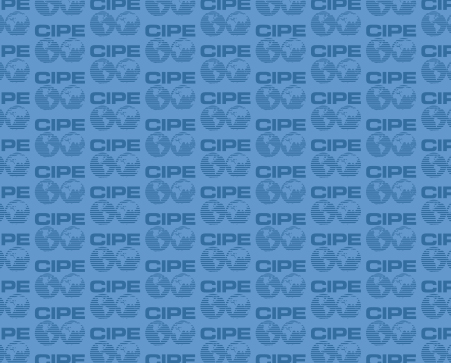
A critical aspect to fulfilling CIPE’s vision is partnership with local organizations, who are not only capable of effectively advocating for policy reforms, but also possess the requisite commitment to democracy and economic development. In Senegal, CIPE is helping to support the country’s democratic consolidation through a multi-year partnership with the Union Nationale des Commercants et Industriels du Senegal (UNACOIS), now Senegal’s largest business association.
Such partnerships endure the inevitable setbacks of advocacy initiatives, delivering marginal progress in the short-term, while ultimately effecting long-term systemic changes. Such partnerships are particularly difficult to foster in the West Africa sub-region of Sub-Sahara Africa, where persistent armed conflicts – along with unfavorable social, economic, religious, and political dynamics – have conspired to imbue most people with significant cynicism towards democratic ideals.
CIPE partnered with UNACOIS on three projects between 2002 and 2008 to help the organization improve its member relations and internal governance. This assistance reinforced UNACOIS’ national scope and grassroots reach, thereby contributing to its development into Senegal’s largest business association, with 80,000 members — nearly 70 percent of whom operate in the informal sector.
After consolidating its organizational governance, UNACOIS recently partnered with CIPE on a project whose objective is to empower and support the SME sector to engage in effective public-private dialogue. With its enhanced institutional capacity and its commitment to the CIPE mission, UNACOIS was able to deliver meaningful impact long before the end of the project. The final project activity was a public-private dialogue between UNACOIS, the Ministry of Commerce, Industry, and the Informal Sector, and other relevant stakeholders from public and private sectors.
The event took place on January 30th, 2013 at the Pullman Hotel in Dakar, Senegal. El Hadj Malik Gakou, the Minister of Commerce, Industry, and the Informal Sector, presided over the event, which had 93 attendees. The attendees were from the Ministries of Finance, Employment, Commerce, and Taxes and Customs; Members of the Parliamentary Committee on Tax and Customs; members of UNACOIS’ national and regional leadership teams; the Senegal National Employers’ Association (CNES); and print and TV media.
UNACOIS and CIPE developed a Public-Private Dialogue document, which was utilized to animate the PPD discussions. The PPD document sought to achieve two main objectives (links in French):
1) To highlight –
- The importance of the SME and informal sectors to political, economic, and social stability;
- The local challenges that bedevil Senegal’s SME operators, especially those in the informal sector;
- Best international practices in creating entrepreneurial societies.
2) To recommend –
- Government support for the creation of regional SME co-operatives, which would provide benefits such as;
- Improved access to finance through a collective guarantee system;
- Better access to compete for public tenders;
- Economies of scale for SME operators within each region.
- The adoption of new technologies in vocational training, which would provide benefits such as;
- Overcoming the issue of low literacy levels among Senegal’s SME operators.
- Government support for sustained public-private dialogue between UNACOIS and the various provincial governments.
The Minister of Commerce, Industry, and the Informal Sector was impressed by the methodology that predicated the document’s findings and assertions. He promised to consult with the Prime Minister of Senegal, who – according to the Francophone system of governance – is the executive leader of the government. On February 4, 2013, UNACOIS received an official invitation from the Prime Minister for a meeting to discuss UNACOIS’ recommendations.
Such successes by UNACOIS, along with other recent ones, have raised its profile across West Africa as a leading business association. CIPE partners in other West Africa countries such as Mauritania, Cote d’Ivoire, and Mali repeatedly cite CIPE’s partnership with UNACOIS as a point of reference. By all indications, the partnership between CIPE and UNACOIS should bear positive consequences in the future. This promise now exists because UNACOIS is fulfilling its potential for strong internal governance and effective advocacy. Most importantly, this promise now exists because UNACOIS possesses a commitment to CIPE’s mission.
Published Date: February 21, 2013
